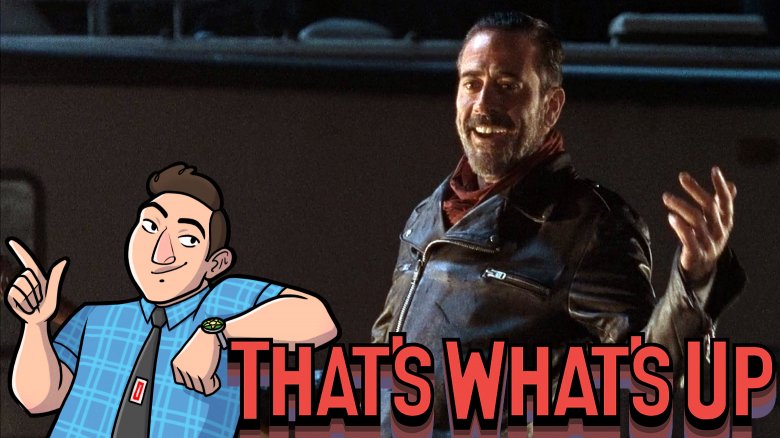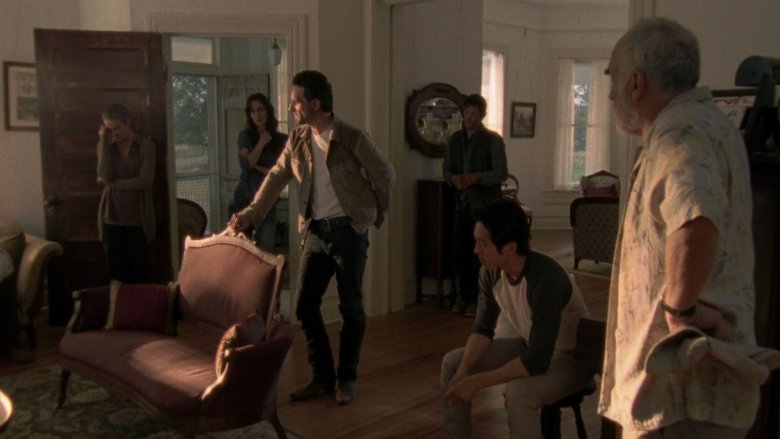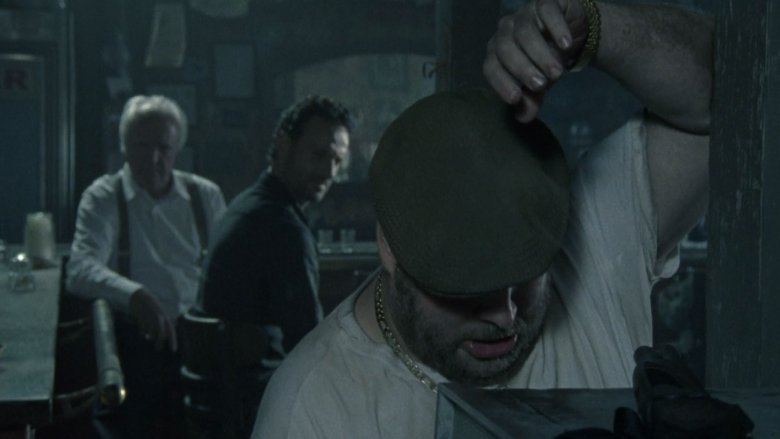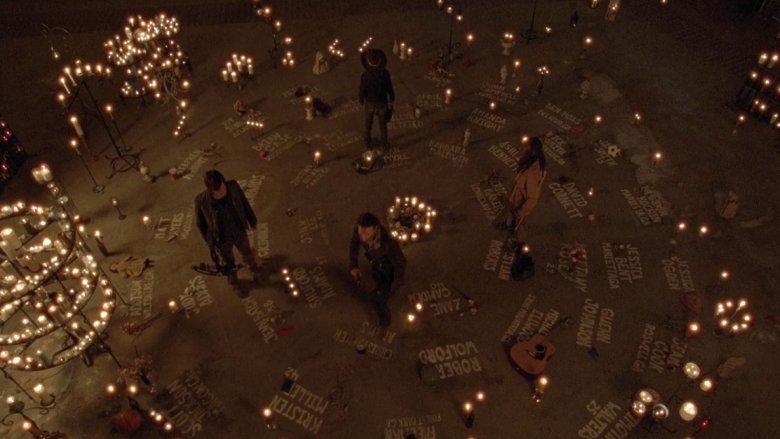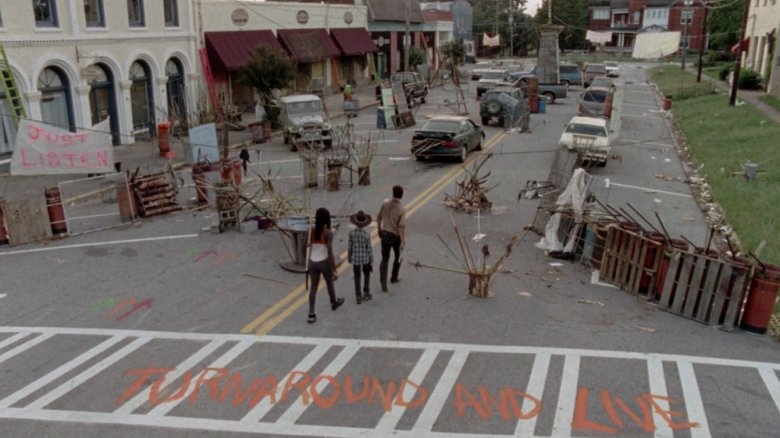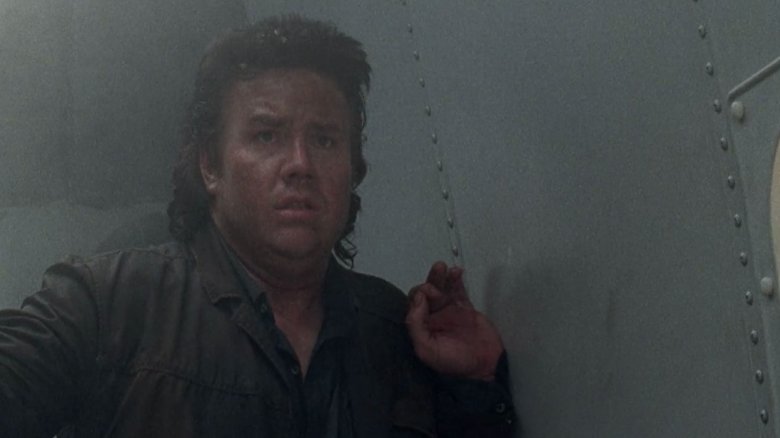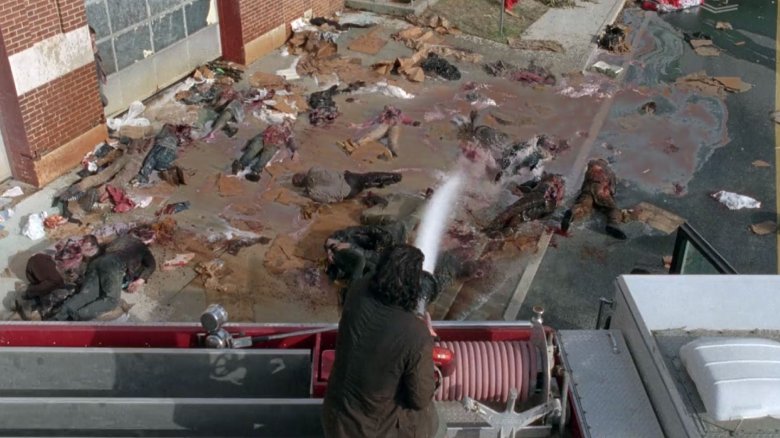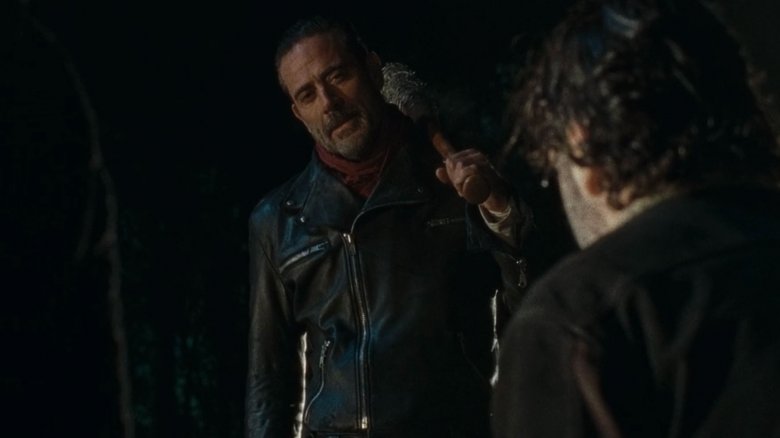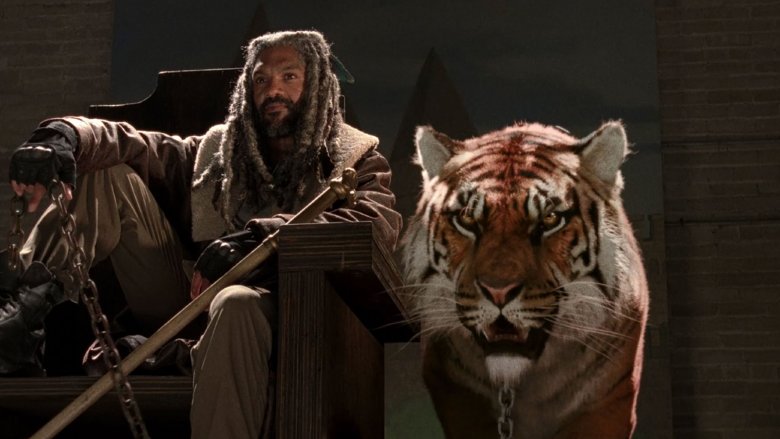That's What's Up: 4 Best And 4 Worst Scenes From The Walking Dead
Each week, comic book writer Chris Sims answers the burning questions you have about the world of comics and pop culture: what's up with that? If you'd like to ask Chris a question, please send it to @theisb on Twitter with the hashtag #WhatsUpChris, or email it to staff@looper.com with the subject line "That's What's Up."
Q: I've seen you mention that you caught up on The Walking Dead TV show. What do you think worked about it? What didn't? — via email
I recently watched 7 seasons of The Walking Dead in about three weeks, and I can tell you this: it's not good, but it does have a few things going for it. See, like a lot of people who spend most of their time writing, I like to have something on for background noise, and TWD manages to strike this perfect balance of being just engaging enough that there's usually something interesting happening whenever I look up, but not so interesting that I'll get caught up watching it instead of getting back to work after a minute or two. In that respect, it's in some pretty rarified company along with Hercules: The Legendary Journeys and the bad seasons of Star Trek: The Next Generation.
But it's interesting that your question mentions what works and what doesn't, because the show honestly does deliver both of those things in shockingly equal measure. Seriously, every single time the show got boring enough or so terrible that I was ready to give up, it would somehow pull out of the nosedive and deliver something genuinely great that kept me watching all the way through. So, since you asked, here's what almost lost me, and what somehow managed to pull me back in.
Worst: Pretty much all of season 2
Before deciding to marathon the entire series, the only episode of The Walking Dead I'd ever watched was the pilot, back when it originally aired. As much as it wasn't my thing then (or now, honestly), I have to admit that the first season is pretty strong. My only real problem with it, aside from Andrew Lincoln's increasingly hilarious attempts at a southern accent, is that the first thing Rick does on the show is walk past a helicopter that appears to be in perfect working order without getting into it. Like, my guy, you are going to have a much better time flying around in a helicopter than walking through the ruins of Atlanta, if only because zombies do not fly. Then again, I guess that just means that what I really wanted to watch was Airwolf vs. the Undead.
By the time we get to season 2, however, the show fully settles into the repetitive pattern that it hints at with season 1's trip to the CDC: the cast goes somewhere, lives there for a while, and then are forced to bail when things go bad. The problem here isn't the going, though, it's the staying. That second season drags like it's trying to win something from RuPaul.
That's partly a function of the show's own success, which led to a second season that was over twice as long as the first but without a plot that expanded to match. The big, overarching problems in that season take forever to wrap up, and while Carol's missing daughter does eventually build to a payoff, it takes its sweet time getting there. Meanwhile, there's a plot about whether they should kill this one dude that seems to run for about 73 years. It's not a bad idea, but it takes forever. They seriously decide to kill him, drive him somewhere, and then drive him back so that they can decide again, and all of this is happening on a farm where no one ever really has to deal with zombies, which is pretty weird for a series called The Walking Dead.
Best: The collapse of society as illustrated by indoor plumbing
Before you get the impression that I'm just going to be a crabapple about everything, there actually is something really interesting that happens in the eon during which rivers are carving out mighty canyons and Andrew Lincoln and Jon Bernthal are growling at each other about whether they should off an NPC.
One thing the show actually does really well is explore the idea of how people react to society crumbling around them, whether it's the different methods and extremes that they're willing to go to in order to preserve and rebuild it, or whether it's the way that they revel in its absence. There's a moment in that arc — the encounter with another group of survivors that kicks off the whole debate to begin with — where one of the bad guys gets up in the middle of a conversation that they're having in a bar and just starts whizzing wherever without even leaving the room.
I'm not being facetious when I say that this is actually a really good character moment. It's a perfect way to show that these are bad dudes without ever saying it. They've completely given up on civilization, and we know that because not having toilet fun wherever you feel like it is, like, the first and most basic rule we have. There's even a callback to it a few seasons later when Daryl, at his lowest point, does the same thing. The show doesn't always go with the show-don't-tell route — there's a much worse version of this idea later on when Rick has a conversation about broken windows and then a window literally gets broken — but it's actually pulled off well.
Worst: The endless pattern
I've already mentioned this in the context of season 2, but really, that's not an inherently bad structure when your show is about exploring life in a world immediately after a zombie apocalypse. The problem is that it all follows the same pattern, over and over. The CDC, the farm, the prison, Woodbury, Alexandria; the same thing happens everywhere they go. By the time they're on their way to Terminus, following the signs that might as well have "DEFINITELY NOT A TRAP ;)" painted on them in foot-high letters, you'd think someone would stop and go "hey, they're totally gonna be cannibals or something, right?"
That's actually one of the reasons that the show makes for good background noise — the pattern is so deeply ingrained that it blends together and you can pick it up without actually having to pay attention — but as an actual story structure, it's really frustrating.
To be entirely fair, it's not like there aren't attempts to add new twists to the formula. As crabby as I can be, I'm not going to sit here and tell you that it's not at least a little interesting when the Governor shows up with a straight up tank, although it raises similar questions to the ones I have about Rick passing up a helicopter. At the same time, the show rarely spends enough time on the more interesting pieces of those encounters.
To go back to Terminus as an example, there are all these really great, detailed environments that tell the story behind that settlement, with the monumentally creepy memorial room that the characters are herded through in their first encounter there. Rather than spending some time on that stuff, though, lingering on the psychological horror aspects that could hint at that backstory, the show instead devotes its time to showing us all the man-is-the-real-monster stuff that we already assumed happened. It's honestly not until they devote an entire season to building up Negan before he's even revealed that the show feels like it's actually twisting that formula into something new instead of just throwing a slightly different obstacle into everyone's way. Of course, I imagine that kind of foreshadowing is a luxury you can only really afford once you're a show that's been a success for five years.
Best: The town full of deathtraps
Every now and then, though, the show takes those interesting little ideas and expands on them just enough, and the perfect example comes in season 3, episode 12 ("Clear"), when Rick and Michonne head back to the neighborhood only to find out that Morgan has built a town full of deathtraps.
Morgan's pretty interesting — the way the show deals with characters like him and Rick dealing or not dealing with an ongoing trauma is one of its best aspects — but the appeal for me here is entirely rooted in the idea that he spent like an entire year rigging up tripwires and baiting zombie traps made of sharpened hockey sticks. The best part, though, is when Rick and Michonne make their way past a series of increasingly hostile signs — including the hilariously worded "AWAY WITH YOU," which managed to work its way into the opening credits — only to be confronted with the final one, a sheet curtain with "last chance" on it. In true Dungeons & Dragons fashion, there was one last tripwire connected to a fire axe that would swing down right at face level. The kicker? The axe had "told you" written on it in tiny letters at an angle that was only visible to the viewer. That is a true chef's kiss moment, and a fantastic gag in a show that's so often just one piece of misery after another.
The only thing better than that is the opening episode of season 6, where the honest-to-God plot is that a bunch of zombies fell into a big hole. That thing's hilarious.
Worst: They keep giving zombies names that are not "zombies"
I understand that not calling zombies "zombies" is a well-worn, time-honored tradition in the genre, but that also seems like the sort of thing you can only really sustain for about two hours. By the time you're at, say, 100 or so, not calling them zombies stretches almost as much credulity as actually having zombies in the first place.
"Walkers" isn't a terrible name for dead bodies that get up and start walking around, but it does sort of imply that they're aware they are in a show called The Walking Dead. "Roamers" is terrible, and "Dead Ones" is accurate, if a little too blunt to really catch on. "Biters" probably makes the most sense — as the biting is a slightly more pressing concern than the walking — but it also makes it sound like the zombies are out there trying to copy your super fresh rhymes, which, honestly, would be a much better show.
Every time they add something new to their grand list of undead euphemisms, it wrenches me right out of the show. Four or five years into this thing, that same dude who should've been warning them about the cannibals should've looked at someone calling them "biters" or "roamers" and said "you talkin' about the zombies or...?"
Best: They keep giving zombies names that are not "zombies" until it gets hilarious
...And then it somehow loops back around to being hilarious.
I'll admit that I can sometimes have trouble trying to figure out when exactly something is in on its own joke. I actually quit reading the Walking Dead comic when Rick turned directly to the reader and said "we are the walking dead!" at the end of #24 — something he also does in a slightly more subtle fashion on the show — but in retrospect, Robert Kirkman's clearly a smart enough writer that he has to know that line is equal parts dramatic and hilarious. Continually giving the zombies new and different names with the excuse that this universe just doesn't have the word "zombie" is sort of the same thing.
Around the time they drop the seventh or eighth term for them, I finally got that it's part of the joke, and when the coastal fishing village referred to them as "bobbers," I realized it was kind of great. It's another example of exploring the central idea of the premise: if society is no longer connected, then all of these tiny, isolated communities are going to develop their own terminology for this new thing, and that's pretty fun.
Worst: Season 7, episode 1
I mentioned before that Negan's actual introduction as the show's main antagonist was the end of a really good build, and it is. The whole "I'm Negan" setup, where the members of his faction are so dedicated to his service that they're willing to fill their role as his eyes and ears even at the moment of their own death makes for a really great swerve once the genuine article shows up. On top of that, Jeffrey Dean Morgan is a charming enough actor that I'd honestly call myself a big fan even though, on thinking about it, I'm pretty sure I don't actually like most of the things he's been in. His first appearance in the season 6 finale has the perfect level of self-assured humor to underscore the palpable menace, and his delivery on the line "when I sent my people to kill your people for killing my people, you killed more of my people? Not cool" is just extremely good. Then the next season picks up, and the show takes it way too far in the name of horrific gross-out shock value.
At its absolute worst, The Walking Dead is just an artless showcase of misery, and that episode takes that idea to its extreme. There are good performances — Morgan and Lincoln actually get some real intensity out of what they're doing — but that wretched thing is an hour that feels like two where a man beats the most likable character on the show to death with a baseball bat, laughing while he sputters his incomprehensible last words at his wife, while all the other characters that we've grown to like (or at least tolerate) over 6 seasons sit there quietly sobbing and shivering like they have malaria.
It's like a parody of the show's most lowest-common-denominator tendencies, but "parody" implies that there's some comedy to it. It's just gross, to the point that after making it through 83 episodes, I was willing to bail on the rest of it. The only reason I didn't was that I was in the middle of something and Netflix started up the next episode before I got the chance to back out of it.
Best: Season 7, episode 2
And once I saw that there was a dude with a tiger coming up, there was no way I was going to stop before I knew what his deal was.
And here's what's wild: aside from that truly wretched first episode, season 7 is easily the strongest part of the entire series. Admittedly, we're sort of past the point where anyone's really worried about the truly massive army of zombies hanging around — probably because they've discovered that their secret weakness is a tendency to fall into very large holes — but everything else about it is massively entertaining. King Ezekiel, his tiger, and his army of post-apocalyptic RenFaire cosplayers are great, but a few episodes later, we get a tribe of full-on Mad Max people who live in caves under a junkyard and refer to a 30-foot tall pile of trash as "the Up Up Up" and have ritualized gladiatorial combat with a zombie that looks like Judge Death.
It is bananas, and I will freely admit that I have a lot of trouble trying to figure out how long it's been since the zombie apocalypse happened. Like, Carl looks like he's in his 20s and seven years seems about right for Negan to build up his empire, but not quite long enough for people to start questing for magic swords or forgetting words like "pile," "of," and "garbage."
It all pays off, too. If there's one good thing about that torturous opening episode — which reportedly went so far that showrunners were convinced to tone things down later in the season — it's that it sets up an expectation of the kind of violence we'll be seeing later. When Negan is about to bash Carl's brains in and instead a giant tiger jumps into the frame and starts eating dudes while knights ride in on horseback to set up the next season's conflict? That's not just the opposite of spending an entire season being sad on a farm, it's exactly the kind of buck wild action I want out of a show about zombies. It was enough to get me hooked to watch the next season whenever it hits Netflix, too, even though I told you about 28 paragraphs ago that I don't actually think it's good. Give me a tiger and some weirdos, and I'm in.
For real, though? I hope they bring that "Easy Street" song back. I'm pretty into it.
Each week, comic book writer Chris Sims answers the burning questions you have about the world of comics and pop culture: what's up with that? If you'd like to ask Chris a question, please send it to @theisb on Twitter with the hashtag #WhatsUpChris, or email it to staff@looper.com with the subject line "That's What's Up."
